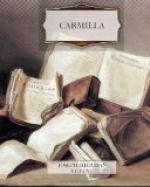So, indeed, she had; and she and I talked a great deal, and very animated she was; and the remainder of that evening passed without any recurrence of what I called her infatuations. I mean her crazy talk and looks, which embarrassed, and even frightened me.
But there occurred that night an event which gave my thoughts quite a new turn, and seemed to startle even Carmilla’s languid nature into momentary energy.
VI
A Very Strange Agony
When we got into the drawing room, and had sat down to our coffee and chocolate, although Carmilla did not take any, she seemed quite herself again, and Madame, and Mademoiselle De Lafontaine, joined us, and made a little card party, in the course of which papa came in for what he called his “dish of tea.”
When the game was over he sat down beside Carmilla on the sofa, and asked her, a little anxiously, whether she had heard from her mother since her arrival.
She answered “No.”
He then asked whether she knew where a letter would reach her at present.
“I cannot tell,” she answered ambiguously, “but I have been thinking of leaving you; you have been already too hospitable and too kind to me. I have given you an infinity of trouble, and I should wish to take a carriage tomorrow, and post in pursuit of her; I know where I shall ultimately find her, although I dare not yet tell you.”
“But you must not dream of any such thing,” exclaimed my father, to my great relief. “We can’t afford to lose you so, and I won’t consent to your leaving us, except under the care of your mother, who was so good as to consent to your remaining with us till she should herself return. I should be quite happy if I knew that you heard from her: but this evening the accounts of the progress of the mysterious disease that has invaded our neighborhood, grow even more alarming; and my beautiful guest, I do feel the responsibility, unaided by advice from your mother, very much. But I shall do my best; and one thing is certain, that you must not think of leaving us without her distinct direction to that effect. We should suffer too much in parting from you to consent to it easily.”
“Thank you, sir, a thousand times for your hospitality,” she answered, smiling bashfully. “You have all been too kind to me; I have seldom been so happy in all my life before, as in your beautiful chateau, under your care, and in the society of your dear daughter.”
So he gallantly, in his old-fashioned way, kissed her hand, smiling and pleased at her little speech.
I accompanied Carmilla as usual to her room, and sat and chatted with her while she was preparing for bed.
“Do you think,” I said at length, “that you will ever confide fully in me?”
She turned round smiling, but made no answer, only continued to smile on me.
“You won’t answer that?” I said. “You can’t answer pleasantly; I ought not to have asked you.”




